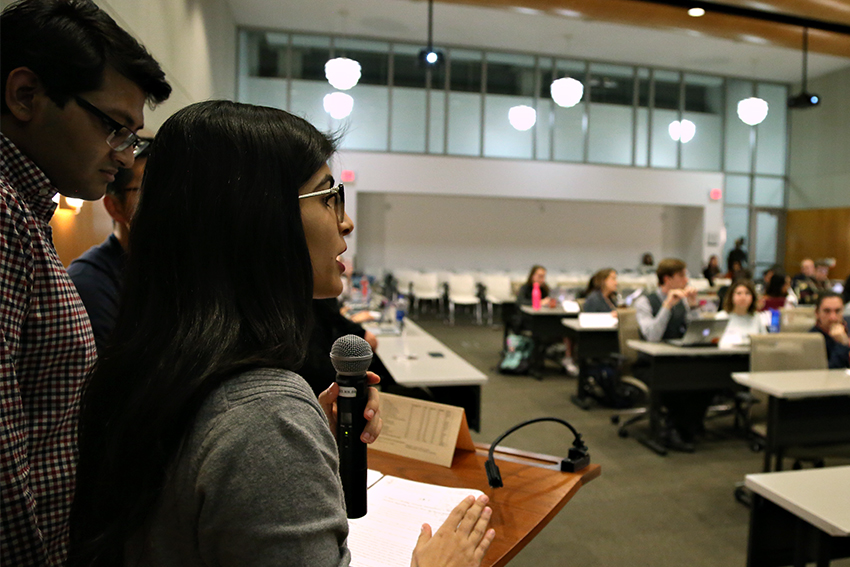In the aftermath of the discovery that a UT professor pleaded guilty to one count of domestic violence and was accused of another, Student Government attempted to fast-track a bill that would hold professors to the same ethical code as students.
“Right now, students are being held to higher standards than faculty are,” said Natalie Engel, legislative policy chair and social work representative.
Joint Resolution 5 included examples of students being dismissed from the University for incidents of interpersonal violence to demonstrate that students and faculty have been held to different standards by the University in the past. After intense debate, the fast-track motion failed because some argued pharmacy students were not included in the legislative process.
The resolution, following the discovery of pharmacy professor Richard Morrisett’s charges, was passed on to the student affairs committee.
“Students have been expelled just for being charged with sexual assault,” said Engel, a social work and communication studies senior. “Even though they were found not guilty, they weren’t readmitted, yet we have a professor who (pleaded) guilty and is still teaching.”
Engel said students should have the written right to know about felonies professors plead guilty to.
“Our end goal is that the University does a review of (its) policies and starts to hold faculty and administration to a higher standard regarding domestic abuse and sexual assault,” Engel said.
J.R. 5 did not specifically call for Morrisett’s resignation, but it did request he publicly acknowledge he “no longer meets the standards necessary to set a proper example for the student body,” according to the legislation.
“There’s got to be someone else that can teach in the College of Pharmacy that’s just as qualified,” said University-wide representative Chloe Harfield.
There were disagreements among the bill’s authors about calling for Morrisett’s resignation, finance senior Harfield said.
“It was hard when we wrote it because a few people said we need to say we are in support of him resigning, but to what length do we go to as student representatives?” Harfield asked. “Asking anyone that commits an act of interpersonal violence (to) step down is a hard thing to stomach, but that’s kind of what we’re all rallying behind.”
To pharmacy representative Lubna Mazin, the clause was unreasonable because it alluded to Morrisett stepping down from his job before pharmacy students had a chance to voice their opinions.
“My students were blindsided by this news (about Professor Morrisett),” said Mazin, a student pharmacist. “Do you think I want to blindside them again with this legislation?”
Mazin said pharmacy students were underrepresented in the bill because they had not yet been polled about what action they want taken against
Morrisett, if any.
“I know people want to get it fast-tracked because it’s in the media, but our students are still grieving,” Mazin said. “We need a moment to catch our breath, see how our students are feeling and see if our students need anything before we can go and rush into legislation.”
The majority of representatives agreed it is important students and professors be held to the same standard.
“We as students are supposed to be looking up to our professors as role models,” Engel said. “This professor does not exemplify the values of the school that I chose to go to, and that’s very frustrating to me.”





















